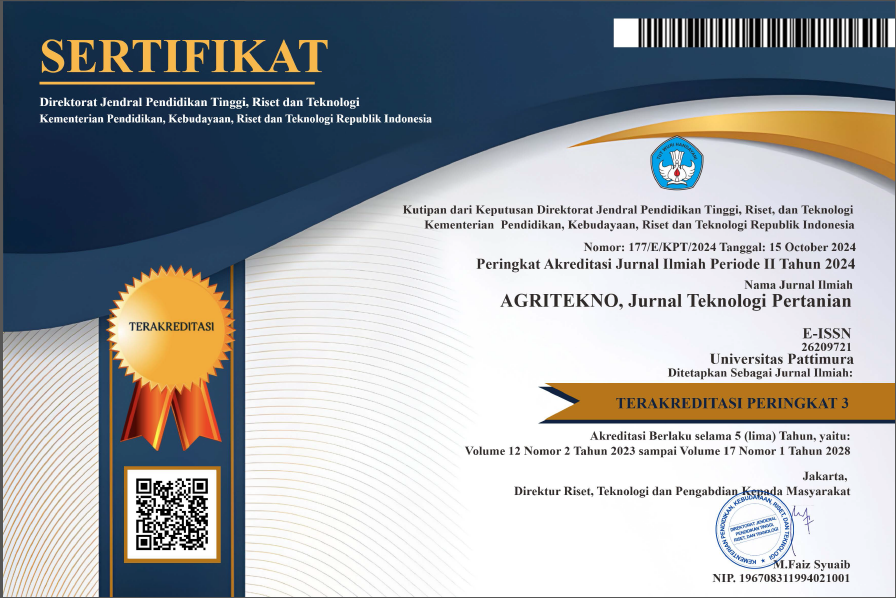PENGARUH KONSENTRASI EKSTRAK AIR SEREH WANGI (Cymbopogon nardus L.) TERHADAP KUALITAS TAHU
Abstract
The objectives of this research were both to know as well as to determine the exact concentration of lemongrass water extract applied during storage on the quality of tofu. A complete randomized experimental design with two factor of treatments was utilized. The first factor was concentration of lemongrass water extract with 3 levels of treatmens, i.e : T1 : 1 kg of lemongrass : 2 L of water, T2 : 1 kg of lemongrass : 3 L of water, T3 : 1 kg of lemongrass : 4 L of water. Whereas the second factor was the storage time, i.e : L0 : 0 day, L1 : 2 day and L3 : 4 day. Variables observed including chemical, and microbial. They consit of protein, moisture, TPC, and Salmonella. Results showed that lemongrass water extract with the concentration of 1 : 4 stored for 4 day had high protein and moisture, content which were 15.4%, and 74.37%, respectively results from microbial test showed that microbial growth was suspressed by the treatments and the content were still in the range set by Indonesian National Standard Agency.
Downloads
References
ï›AOACï Association of Official Analytical Chemistry. 2005. Official Method of Analysis. Washington.
Friedman, M., P.R. Henika, & R.E. Mandrell. 2002. Bacterial activities of plants essential oils and some of their isolated constituents against Ecampylobacter jejini, Escherichia coli, Listeria monocytogenes and Salmonella enteca. Journal of Agricultural and Food Chemistry 65: 1545-1560.
Indrati, R. & M. Gardjito. 2013. Pendidikan Konsumsi Pangan. Kencana Prenada Media Group. Jakarta.
Luangnarumitchai, S., S. Lamlertthon, & W. Tiyaboonchai. 2007. Antimicrobial activity of essential oils against five strains of Propionibacterium acnes. Mahidol University Journal of Pharmaceutical Sciences 34: 60-64.
Miftakhurohmah. 2008. Potensi serai wangi sebagai pestisida nabati. Warta Penelitian dan Pengembangan Tanaman Industri 14: 1-33.
Nychas, G.J.E. 1995. Natural Antimicobrials From Plant. Halaman 58-89 in G.W. Gould G. 1995. New Methods of Food Preservation. Blackie Academic and Professional. London.
Pelczar, M.J. & E.C. Chan. 1988. Dasar-Dasar Mikrobiologi Jilid II. Diterjemahkan oleh S.R. Hadipetomo. Penerbit Universitas Indonesia. Jakarta.
Suhardi. 1997. Perubahan tanin, asam malat, asam sitrat dan vitamin C dalam salak pondoh selama periode perkembangan buah. Buletin Agro Industri 3: 38-44.
Suprapti, M.L. 2005. Pembuatan Tahu. Kanisius. Yogyakarta.
Suprianto. 2008. Potensi Ekstrak Sereh Wangi (Cymbopogon nardus L.) Sebagai anti Streptococcus mutans. ï›Skripsiï. Program Studi Biokimia Fakultas Matematika dan Ilmu Pengetahuan Alam, Institut Pertanian Bogor. Bogor.
Widiyanti, N.L.P.M., S. Mulyadiharja, & I.N. Sukarta. 2016. Analisis ekstra tumbuhan rempah sebagai preservatives makanan tahu diuji secara in vitro. Jurnal Sains dan Teknologi 5: 833-848.
Authors who publish with this journal agree to the following terms:
- Authors retain copyright and grant the journal the right of first publication with the work simultaneously licensed under a Creative Commons Attribution License that allows others to share the work with an acknowledgement of the work's authorship and initial publication in this journal.
- Authors are able to enter into separate, additional contractual arrangements for the non-exclusive distribution of the journal's published version of the work (e.g., post it to an institutional repository or publish it in a book), with an acknowledgement of its initial publication in this journal.
- Authors are permitted and encouraged to post their work online (e.g., in institutional repositories or on their website) prior to and during the submission process, as it can lead to productive exchanges, as well as earlier and greater citation of published work (See The Effect of Open Access).









